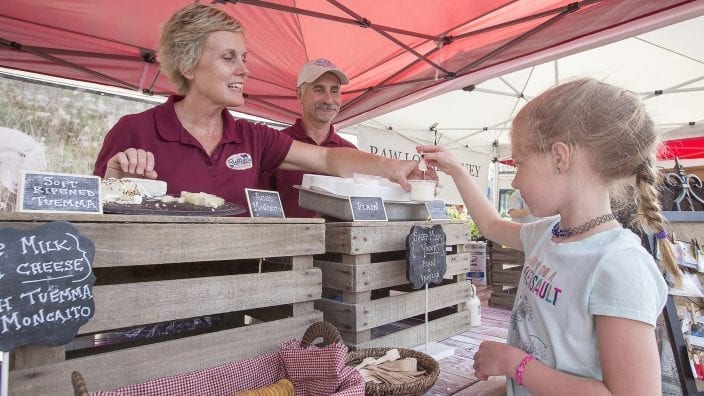Farmer’s Guide to Trucking Regulations available to Ohio Farm Bureau members
The guide includes a farm driver checklist, overview of state and federal regulations and exemptions, CDL qualifications and more.
Read More
One of the most controversial topics involving agriculture and the food supply is Genetically Modified Organisms (GMOs). Genetically Modified Organisms are living beings that have had their genetic code changed in some way. While I personally feel that GMOs are necessary to increase yields which is needed to feed the growing population of the world and to combat diseases and insects, I also feel that it is everyone’s right to choose the types of products they use.
In order to know what is in our products, we utilize labels right? Labels can be a great source for knowing what is in your food, nutrition facts, who produces the food, and even where it comes from. In 2016, Congress passed a bill that established a federal standard for labeling foods that have been made with genetically modified organisms. The bill requires food manufacturers to use one of three types of labels to inform consumers when GMO ingredients are in their products: a statement on the package, directions to a website or a phone number, or a QR code.
Labels can be great…but labels can also be misleading (which I still to this day don’t understand because of laws that say labels cannot be “false or misleading” but I’ll save that rant for another day). The FDA requires the labeling, but food producers have relative freedom in how they go about providing the customers with the required information. Ever heard of the Non-GMO project and seen its butterfly label? I grabbed a gallon of ”name brand” orange juice out of the cooler at the grocery store, branding a Non-GMO Project -Verified seal on its label. Here is the issue, this particular brand is 100% orange juice..and there are no commercially grown genetically engineered oranges. NONE. ZIP. ZERO. NONEXISTANT. Every brand of orange juice is naturally “non-GMO,” provided the only ingredient is oranges, which this particular orange juice was 100% orange juice. Seems pretty false and misleading to me. The Non-GMO project is out of control – with almost 50,000 products bearing that label. Kitty litter, salt, and more!
With all that being said, labeling guidance provided by USDA FSIS explains the following labeling terms as:
Not genetically modified” or “Non-genetically modified.” The term “genetic modification” encompasses a broad range of methods that can be used to alter the genetic composition of a plant. FDA’s longstanding position has been that the term has traditionally been used broadly to signify the alteration of the genotype of a plant using any technique, new or traditional. The term “modification,” in this context means the alteration in the genetic composition of a plant that results from adding, deleting, or changing hereditary traits, irrespective of the method. Modifications may be minor, such as a single mutation that affects one gene, or major alterations of genetic material derived from conventional breeding (e.g., selection) that affect many genes. Because the term “genetically modified” can encompass any alteration to the genetic composition of a plant, including alterations achieved through traditional hybridization or breeding techniques, that term could apply to most cultivated food crops since most food crops are the product of selective breeding.
GMO free,” “GE free,” “does not contain GMOs,” “non-GMO,” and similar claims. The term “free” conveys zero or total absence unless a regulatory definition has been put in place. FDA recommends that manufacturers not use food labeling claims that indicate that a food is “free” of ingredients derived through the use of biotechnology. Instead, FDA recommends that manufacturers consider the use of other types of statements to indicate that plant-derived food has not been produced using bioengineering.
What foods are genetically modified you ask? You may be surprised that the list of genetically modified crops available in the United States and Canada only contain eight crops. That is right only eight! Those are corn (both field and sweet), soybeans, cotton, canola, alfalfa, sugar beets, papaya and squash. Three more have been approved but are not available on the market yet: arctic apples, innate potato, and aqua bounty salmon.
Go forth, conquer the grocery store, share what you learned, and don’t let someone brag about their oranges or 100% real orange juice being GMO free because, well there are no GMO oranges.
Mandy Orahood is an Ohio Farm Bureau Organization Director serving Ashtabula, Geauga, Lake, and Trumbull Counties. Mandy can be reached at [email protected].


The guide includes a farm driver checklist, overview of state and federal regulations and exemptions, CDL qualifications and more.
Read More


The emergency fuel waiver to allow the sale of summer gasoline blends containing 15% ethanol will lengthen the period during which Americans can continue buying E15 from June 1 to Sept. 15.
Read More

The Small-Scale Food Business Guide covers federal and state regulations for selling food products such as raw meat, dairy, eggs, baked goods, cottage foods, fruits and vegetables, honey and more.
Read More

New resources and technology are broadening the different types of sales tools and strategies available to farmers.
Read More

ODA will enroll 500,000 acres into the program for a two-week sign-up period, beginning April 22, 2024, through May 6, 2024. Contact local SWCD offices to apply.
Read More

Katie Share of Columbus has been named ExploreAg and Youth Development Specialist for Ohio Farm Bureau.
Read More

Mary Klopfenstein of Delphos has been named Young Ag Professional and Ag Literacy Program Specialist for Ohio Farm Bureau.
Read More

The plan has been updated to give sole proprietors access to more rate stability and a smart solution that offers potential savings on health care.
Read More

The American Farm Bureau Federation, in partnership with Farm Credit, is seeking entrepreneurs to apply online by June 15 for the 2025 Farm Bureau Ag Innovation Challenge.
Read More

Adele Flynn of Wellington has been elected treasurer of the Ohio Farm Bureau Federation and now holds the third highest elected office in Ohio’s largest and most influential farm organization.
Read More